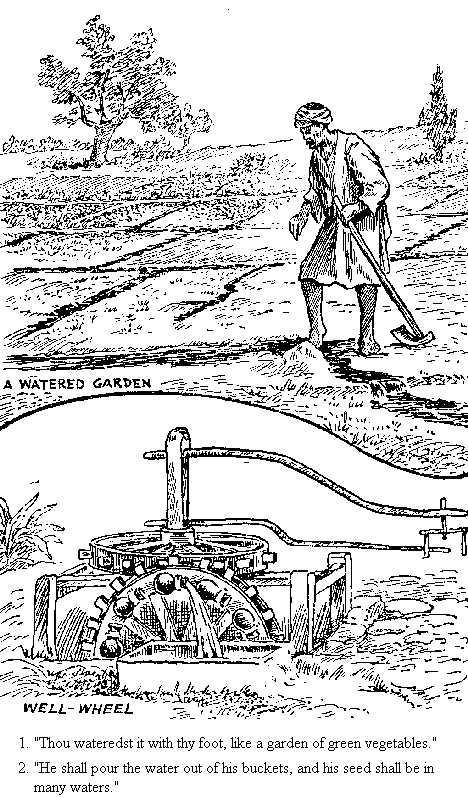Peeps into Palestine – Watered Gardens
by James Neil
Joppa, the Beautiful,
for so is the meaning of its name, let me show in what its beauty consists. There is nothing grand or lovely in the town, or its site, or the form of the surrounding country; and a freethinker sailing close by might well come home and declare that it in no way answered to its Hebrew name. But it is exceedingly beautiful for all that, in a way which you only come to comprehend when you are thoroughly acquainted with its surroundings, on account of the glorious groves of orange with mingled lemons, palms, bananas, pomegranates, and all manner of precious and graceful “fruitful trees” that extend for miles around the little town. The orange, which forms the principal produce of these rich semi-tropical gardens, is a noble evergreen, which is in full bearing at mid-winter, and is one of the choicest and most vigorous members of the vegetable kingdom. Captain Conder, RE, has pointed out that these suburbs of Joppa owe their splendid fertility to a wide underground river flowing beneath the plain of Sharon to the sea. The water is tapped by wells, some 10 feet across by from 50 feet to 80 feet deep, and then what is needed for irrigation is drawn up by means of two rude wooden wheels working an endless band, to which a number of small buckets are attached. “He shall pour the water out of his buckets, and his seed shall be in many waters” (Num 24:7), is an allusion to this Sakkieh, or well-wheel. In these words Balaam foretells that Israel shall derive much wealth and comfort from the culture, in Palestine, of
“Watered Gardens,”
to which, for their wealth of fruitfulness and beauty, the prophets afterwards likened their happy life in the glorious coming age: “Their soul shall be like a watered garden” (Jer 31:12; see also Isa 58:11). The burning rainless heat for six months running, from the end of April to the end of October, makes it impossible to have a garden of any value in Palestine unless it is thoroughly irrigated once a week; and possible, when thus supplied with “the water of life,” to have one that is green and fruitful all the year round, yielding no less than four crops, and the varied products of almost all temperate and tropical climes! In these “watered gardens” the labourers, all of whose limbs are naked, work almost as much with their feet as with their hands. The ground is divided into little plots about 12 feet square, surrounded by tiny trenches, and, when turning the rills from the main stream into each of these, the gardener kicks a hole with his foot into the trench through the lightly turned-up soil, and after sufficient water has run past he stops up the breach in the same easy fashion. Hence, when Moses, speaking of Egypt, says to Israel, “Thou wateredst it with thy foot, like a garden of green vegetables” (Deut 11:10), he simply alludes to the important fact, that, in the rainless land of the Pharaohs, farm-culture needs irrigation, natural or artificial, in the same way as garden-culture requires it in the more favoured climate of Palestine, where sufficient rain falls to raise the main crops.



